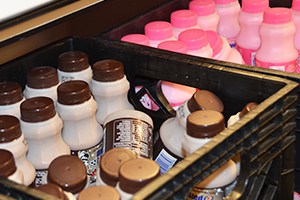Milk, cheese and yogurt contribute essential nutrients to school meal programs. Milk is the number one source of protein for kids 2-11, and it’s the top source of calcium, potassium, phosphorus, and Vitamin D for children ages 2-18, however most kids and adolescents don’t meet the daily dairy intake recommendations made in the Dietary Guidelines for Americans. Additionally, studies show that consuming dairy foods can improve the overall nutritional quality of the diet, including in children and teens.
The American Dairy Association Mideast is proud to support Ohio and West Virginia schools to ensure that students have access to the nutrient-rich dairy foods they need to succeed in the classroom.
Tools for Schools
We offer tools to assist school nutrition professionals in providing healthy and kid-friendly meals to students. These resources include creative menu ideas, technical assistance and grant opportunities to support sustainable menu changes featuring white and flavored milk, yogurt and cheese. Our resources may also provide opportunities to increase school meal program revenue.
Serving dairy in innovative ways, like hot chocolate milk or overnight oats, can be a great way to increase participation and bridge nutrient gaps. Incorporating foods like low fat yogurt into school menus is a great way for students who do not drink milk to benefit from dairy. Parfaits, smoothies, yogurt bars and yogurt-based recipes can all be part of a reimbursable school meal.
In addition, we offer educational materials about dairy farming and how dairy foods are produced. Through our national in-school health and wellness program Fuel Up, we provide strategies, resources and funding opportunities to aid students and educators in improving the school wellness environment through increased access to healthy foods. We also provide Farm to School educational materials to teach students about the connections between good nutrition and the role farmers play in creating wholesome dairy foods and protecting our environment.
If you have questions about dairy in school meals, please consult our frequently asked questions page or ask an expert.





